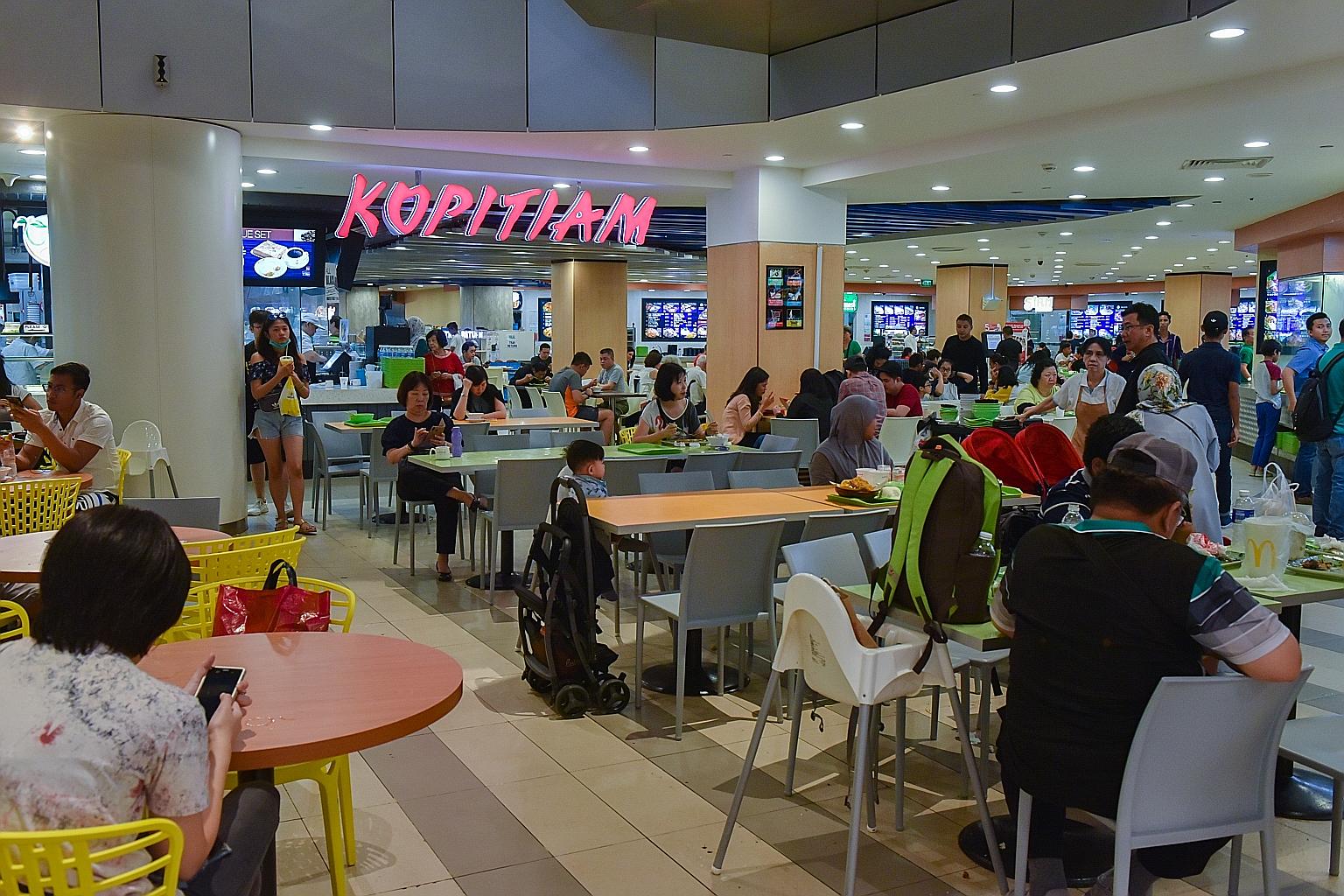NTUC Enterprise's acquisition of Kopitiam: Little impact expected in the short term
NTUC now biggest player but still makes up less than 10% of market, says expert
Sign up now: Get ST's newsletters delivered to your inbox

The Kopitiam foodcourt in VivoCity. NTUC Enterprise's promise to make affordable food more widely accessible with its expanded stable of outlets may be a tall order, say observers. The price of food, they say, is tied closely to its biggest operating cost, which operators often have little control over - rental.
ST PHOTO: JASMINE CHOONG
Tiffany Fumiko Tay
Follow topic:
NTUC Enterprise's acquisition of Kopitiam is not likely to have much impact on food prices or market competition in the short term, industry observers said. They also said its promise to make affordable food more widely accessible with its expanded stable of food outlets may be a tall order.
The price of food, they said, is tied closely to its biggest operating cost, which operators often have little control over - rental.
Foodcourt and coffee-shop operators typically lease premises from landlords and sub-lease stalls that they do not run themselves.
Mr Hong Poh Hin, chairman of the Foochow Coffee Restaurant and Bar Merchants Association, which represents over 400 coffee shops, said that while the coffee shops of Kopitiam and NTUC Foodfare (which is under NTUC's social enterprise arm) may be able to benefit from economies of scale, "rental depends on the market, and ultimately they cannot be running at a loss".
NTUC Enterprise's planned acquisition of Kopitiam is unlikely to have much impact on the competitive landscape, he said. "Singapore has over 1,200 coffee shops - NTUC may now be the biggest operator, but it still makes up less than 10 per cent."
Food Republic, when asked whether it had plans to adjust its prices in response to NTUC Enterprise's plans to lower its prices of coffee and tea, said it continually improves its food offerings and pricing options and does not "purely compete on a singular factor to attract consumers to our outlets".
-
Why the merger is not anti-competitive
NO SUBSTANTIAL LESSENING OF COMPETITION
The Competition and Consumer Commission of Singapore assessed the deal's impact in three areas: The sale of hot meals to consumers in hawker centres, coffee shops and foodcourts, the rental of stalls in hawker centres and the rental of stalls in coffee shops and foodcourts.
It found that in areas where there were overlapping Kopitiam and NTUC Foodfare establish-ments, their combined market share based on the number of food stalls fell below its threshold of a merger situation that may raise competition concerns.
STIFF COMPETITION
Strong competition remains from operators such as Koufu, Food Junction, Food Republic, Kimly and Broadway. Kopitiam and NTUC Enterprise are also not each other's closest competitors, the commission said.
COLLUSION UNLIKELY
Collusion between foodcourts and coffee shops is unlikely due to the large number of competing operators and low barriers to entry, among other factors.
FOOD VENDORS HAVE SOME BARGAINING POWER
Vendors are likely to consider switching to foodcourts and coffee shops farther away if these locations offer them better business prospects, the commission said. NTUC Enterprise has also said that it will not mandate food vendors to procure their food supplies from NTUC Enterprise on an exclusive basis.
Tiffany Fumiko Tay
Koufu declined to comment, while Food Junction, Kimly and Fei Siong did not respond to queries.
Kimly will be launching its own brand of iced tea and coffee by next March, as well as growing the number of coffee shops and foodcourts it operates from 67 to 70 by the end of the financial year ending Sept 30 next year, The Business Times reported on Tuesday.
Associate Professor Burton Ong of the National University of Singapore's law faculty said that as Kopitiam and NTUC Enterprise compete with each other in the market for renting food stalls to hawkers, the acquisition will undoubtedly lessen competition between them. "The legal question is whether this lessening of competition is 'substantial', which the CCCS (Competition and Consumer Commission of Singapore) has decided not to be likely."
Prof Ong also expressed doubt that the continued existence of other operators would pose a significant competitive constraint on the merged entity.
Nanyang Polytechnic's School of Business Management director Esther Ho said the CCCS considered many factors in its evaluation. Still, independent coffee shops will find it increasingly difficult to compete with such chains, which have stronger bargaining power over their suppliers and economies of scale, she said.
"Perhaps this will be the trigger for more innovative independent coffee shops to be developed," she said.

